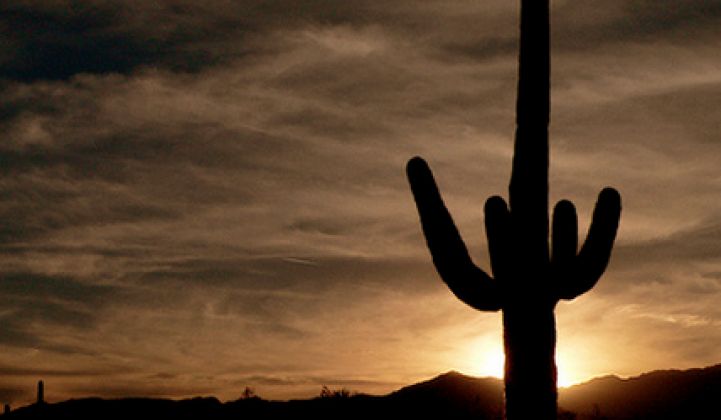The Edison Electric Institute, the trade association representing U.S. investor-owned utilities, is at it again. Over the past year, this monopoly of monopolies has been working overtime -- taking extraordinary, unprecedented actions -- to rid the world of the scourge of people generating their own power with solar.
The latest: on February 18, EEI filed official comments (PDF) with regulators in Arizona on the subject of valuing distributed generation renewables, including rooftop solar.
It’s a remarkable document. EEI wants a fair and balanced evaluation of distributed renewable generation which specifically excludes both the distributed and the renewable values.
Some pertinent quotes:
- “Grid security and reliability values should not be considered in rates.”
- “Environmental and social externalities should not be included in DG rates.”
- “DG systems should not be compensated directly for reducing market prices.”
- “Even if it can be determined that DG systems may make known and measurable net contributions to the security and reliability of the system...they should not receive additional compensation.”
- “EEI believes that although avoided transmission and distribution may be theoretically relevant to determining adequate compensation for DG, the measurement of such components is too speculative at this time.”
EEI also makes the case that if a value can’t be determined with a level of precision sufficient to its liking, it should be assumed to be zero. You say five, someone else says six, and EEI meets you in the middle at zero. Or to offer another analogy, MIT researchers calculate that fossil-fueled power plants shorten the lives of 52,000 Americans a year. If you and EEI can’t agree on the value of Grandma’s life, they want to call it even at zero. Sorry, Grandma.
The group's arguments are not fooling anyone, including the Arizona regulators who were not impressed by the $500,000 in television ads that EEI ran attacking solar customers. Nor NRG, one of the largest utility companies in the country, which ended up running a full-page ad in the Arizona Republic calling out EEI for its anti-solar and anti-consumer efforts.
It’s all but unprecedented for EEI to file in a state docket. In the twelve years that Vote Solar has been doing regulatory work around the country, we’ve never seen it happen before. Of all the issues facing energy in this country, this is the one that motivated EEI to take a stand. Global climate disruption driven by fossil-fuel emissions from electric power industry? Ehh, someone else’s problem. Fuel shortages and cost spikes resulting in ‘sticker shock’? Yawn. Ratepayers paying $1.7 billion (and utilities profiting) for failed utility investments that will never generate a single kilowatt-hour of electricity? Hey, can’t make an omelet without breaking some eggs. People going solar? Now that’s a bridge too far!
Frankly, EEI is making a great case for why the status quo needs to be changed. Significant majorities of Americans want to see a rapid transition to renewable energy. EEI has failed to deliver collective solutions, and now it is fighting to prevent individual actions.
In the immortal words of Georgia Public Service Commissioner Bubba McDonald:
“I don’t know what gas prices will be in six years. But I know the sun will come up, and it’s free. It’s not owned by Georgia Power, it’s not owned by Bubba McDonald, it’s not owned by the Public Service Commission. It’s free. And to deprive people of the opportunity to take advantage of technology, to me, is wrong.”
***
Adam Browning is the executive director of Vote Solar.



